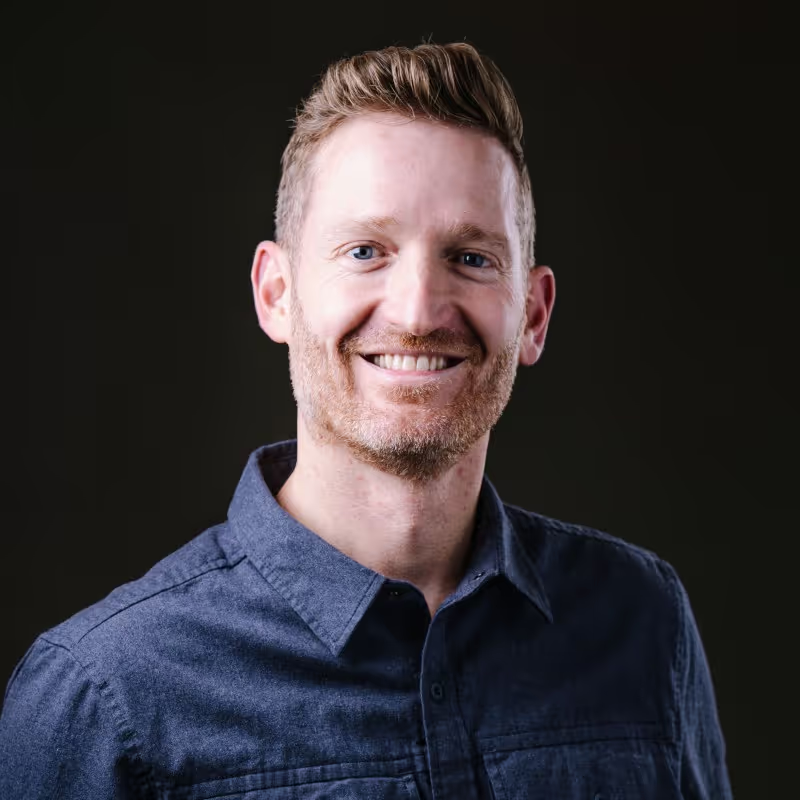The Transform Dialogues: People, Culture & The Future of Work with Adam Weber
.avif)
The Transform Dialogues: People, Culture & The Future of Work with Adam Weber
Live from Transform, we kicked off one of the first episodes of the Transform Dialogues — a People Strategy Leaders podcast series exploring the emerging realities of people, culture, leadership, and the future of work. Executive coach and two-time founder Adam Weber joined Zech and Amy for a candid, energizing conversation about the pressures leaders face today, how the roles of founders and Chief People Officers are evolving, and why the next era of performance will require clarity, alignment, and deeply human leadership.
Adam brought a unique lens: he has been both a founder and a Chief People Officer, giving him a rare vantage point on the tensions, expectations, and opportunities emerging at the intersection of talent, technology, and high-performance cultures.
Session Recap
Adam opened by describing how dramatically founder life has shifted in just a few years. Gone are the days of unlimited spend and “growth at all costs.” Today’s founders must operate with disciplined budgets, smarter prioritization, and the ability to align teams rapidly while still sustaining collaboration and momentum. Yet beneath those business pressures sits an emotional weight that both founders and people leaders now share. The leaders who are thriving, Adam emphasized, are the ones who acknowledge the intensity of the role, face the pressure honestly, and still show up with steady, calm presence.
On the Chief People Officer side, Adam highlighted a growing need for influence, conviction, and cross-functional assertiveness. CPOs today must be more than guardians of HR processes — they must spot misalignments between departments, challenge outdated structures, and boldly reshape roles for the future. As AI shifts job responsibilities and creates entirely new categories of work, people leaders must be willing to redesign roles, reduce outdated functions, rethink headcount, and champion talent reinvention. This requires confidence, strategic clarity, and the courage to lean in — not lean back.
The conversation turned to performance, where Adam challenged the misconception that “performance cultures” should look like intensity, busyness, or return-to-office mandates. High performance, he argued, begins with radical alignment: individuals knowing exactly what matters most, how their work drives the business, and how to use extra capacity to advance priorities. Managers — often undertrained and promoted too quickly — are the bottleneck or the breakthrough. Without role clarity, coaching skills, or structure, most managers default to doing the work themselves, creating burnout cycles that spread across the organization. True performance cultures combine high expectations with high care: clarity, feedback, steadiness, and humanity.
Adam closed with a bold prediction: the coming surge of deepfake job interviews. As AI rapidly advances, he believes the workforce is radically underestimating how quickly deepfake candidate interactions will surface — and how unprepared most teams are. Hiring, confidentiality, and candidate trust may be challenged in entirely new ways.
Key Takeaways
- Founder life has changed — budgets are tight and alignment matters more than ever.
- Pressure on leaders is heavier than ever, requiring emotional resilience and calm presence.
- CPOs must expand influence beyond HR and lead with clarity and conviction.
- Bold talent decisions are needed — some roles won’t exist in the near future.
- Job redesign, upskilling, and talent reinvention will define the next decade.
- Managers are the linchpin of performance, engagement, and culture.
- High performance = clarity + alignment — not busyness or visibility.
- Most employees don’t know their top priorities — and that is a leadership issue.
- High care + high expectations creates healthy performance environments.
- Deepfake interviews are coming fast, and HR is unprepared.
Final Thoughts
The future of people leadership isn’t about perfection or rigid performance demands — it’s about clarity, courage, alignment, and a willingness to evolve old patterns. As Adam shared, the roles of founders and CPOs are intersecting in new ways, both demanding strategic thinking, emotional intelligence, and a steady hand in uncertain environments. Leaders who combine conviction with compassion will shape healthier, more adaptive organizations — and ultimately, better futures for their people.
Program FAQs
1. What challenges are founders facing right now?
Controlled budgets, rapid alignment needs, and ongoing emotional pressure.
2. What’s changing for Chief People Officers?
Greater expectation to influence beyond HR and drive cross-functional alignment.
3. Why do CPOs hesitate to assert themselves?
Internalized rejection, humility, unclear territory, and fear of overstepping.
4. What skills matter most for today’s CPO?
Conviction, assertiveness, strategic clarity, and organizational pattern-spotting.
5. What defines a true high-performance culture?
Clear priorities, aligned roles, consistent feedback, and a human-centered approach.
6. Why do managers struggle in modern organizations?
They’re promoted from IC roles without training, causing cycles of burnout and confusion.
7. What is "radical alignment"?
Everyone — at every level — knows the top priorities and how their work drives the mission.
8. How should CPOs prepare for AI’s impact on roles?
Be bold: redesign jobs, eliminate outdated roles, and build learning cultures.
9. What pressures are leaders carrying today?
Constant weight of decision-making, performance expectations, and emotional load.
10. What emerging risk should HR watch closely?
Deepfake interviews — an underrecognized threat coming quickly into hiring processes.
We are live at Transform For the Transform Dialogues, one of our first episodes, people,culture and the Future of Work, part of the People, street People StrategyLeaders podcast.
And I'm Zach. I'm Amy. And we're joined by Adam Weber. Adam, Excited to havethis conversation with you.
You're also speaking here at Transform, which is really exciting.
Uh, share a little bit about yourself. What are you working on?
Yeah, I'm a, I'm an executive coach.
I basically work with two types of people.
I work with early stage founders, which I was, I had two startups that I'veexited from in the past.
And then I also served as a Chief people officer in my last startup.
Um, and so I also help chief people, officers mostly, um, focused on expandingtheir influence, balancing like the intensity of the job and maintaining likeyour sense of wholeness.
Yeah. In the midst of that.
Um, and like just growing, growing as a person, maximizing who you're capableof being, that sort of thing.
That's how it'd be a really exciting space.
Obviously the people officer space is kind of a role that's continued to growinto a larger strategic position.
And then also you're very tapped into the founders themselves.
What are some of the things you're noticing?
Like what are some of the things they're dealing with?
Challenges or top of mind for some of these leaders?
Yeah, for founders or for chief people officers. Which one you want me to startwith?
Yeah, let's start. Founders. Yeah.
I think founders, the game is like different than it was five years ago.
Like the, um, endless budgets and endless spend is just not there.
And so basically controlled spend.
And then how do you maximize the output of your team and gain rapid alignment,rapid collaboration to drive performance is kind of like the main topic.
I think there's, I think for them and then, you know, what they're talking tome about too though is like, there I do, I do think, and this is similar bothroles.
There's a pressure and a weight that is just so constant in both of those twojobs.
Yeah. And so then the people that are succeeding are the ones who are able tolike not dismiss that weight.
'cause it's not something you can just make, go away, but really face it andthen kind still be able to show up with a, a calm, steady presence to reallylead people.
Like, 'cause there's two types of founders and everybody's listen.
If there's founders, you know, if there's employees listening right now whowork with founders, it's like there's the founder with the chaotic idea thatcomes up all the time.
It's like they'll go to an offsite retreat, build a strategy, two weeks later,go, nevermind.
I take it all back. There's a new idea I just heard of.
And everyone else in the company is just like, what do we, it's likewhiplash.
Right? Okay. And so you're, you're trying to kind of help that person trulylearn how to prioritize and truly learn what's important, but also like youdon't wanna lose that magic either.
That's a really unique personality that can force momentum.
Um, so that, that's probably on the founder side.
Those are a few of the things that I'm talking about. Yeah.
What about the chief people officer side?
Do you feel like those roles are aligned as well in some of these things?
Or is there a whole different maybe, uh, uh Yeah.
Priority list. Top like challenge list Yeah. That they're facing.
I think the big thing right now that comes up a lot is like trying to expandtheir influence outside of the people function and like really understanding whattheir role is in that.
Like, I always challenge a, a chief people officer of like, you should be themost important person on the exec team other than the CEOs.
And you are, 'cause you, you have the benefit of having the holistic vantagepoint.
Like when I was an executive over the sales function, yes, I was still anexecutive, I contributed, but I was very much like over my territory,right?
Like try. Whereas the, the people function is really at its best a functionthat looks above and does look kind of at the rest of the organization, butthere's like a trepidation with chief people officers and really asserting thatlevel of, of influence inside the organization.
Spotting misalignments between departments is like a classic thing that a chiefpeople officer right now I think needs to grow in.
I think, uh, honestly, here's like, if you're talking about the future of work,here's my like, future of work chief people officer hottest take.
I have, there are so many jobs that exist right now in the workforce that areeither, that either don't need to exist already or are about not to.
And being bold enough to recraft a vision for, for, and basically recraft jobsinside of the company.
Leverage the talent you have, um, upskill that talent or train them, have areally great learning culture and then be willing to like go, Hey, let's, I'mjust gonna go bold here.
The sales development role inside your company.
We don't need that anymore.
We actually need people that do event based follow up and this is, you know, orwe need half as many people to do this role.
And just taking a little bit more of like an assertive approach toward how youmanage talent inside the company.
Why do you think there is that trepidation?
Like what gets in the way of that chief people office here from expanding intothose other areas kind of breaking down the side?
Uh, well there's a lot. I it's a, it's a great question.
It's kind of complicated.
Like, I wish there was like a simple answer.
I think a lot of it is internalized, um, rejection.
Um, and I also think there's like a reality that a lot of other SA salesproduct is a good example where like you, when you grow up through thosefunctions, you are so used to being told no and still pushing.
You're like, Nope, no, you don't.
You know, and then you just like lean in.
And whereas there's this like tension with the chief people officer a lot oftimes on executive teams.
'cause they're also just humble.
I think they're the best people on ex like human beings.
They're great human beings.
But oftentimes that can create like a, a lean back posture versus like a leanforward posture.
But it's d it's, it's different for everybody and it's also hard for the restof the executives because it's kind of a new concept.
It's not a well-worn path.
Like a well-worn path at companies is like a chief fin, A CFO who always saysno the first time you bring an idea to 'em.
We've been doing that for a hundred years.
People are very used to it.
This kind of forward-leaning chief people officer that's driving highperformance and adjusting roles and spotting issues of, uh, cross departmentallack of collaboration and creating steadiness inside the culture is kind offresh.
And so anytime things are fresh, I do think human beings just are resistant,you know?
And, um, other executives are territorial and a lot of times we're talkingabout areas that I wouldn't say they own, but they're not certain who ownsit.
And so the territory is not fully defined as well.
And that's actually been a pretty ongoing theme within our network as well,with chief people officers about like, okay, what are the skill sets, thecharacteristics of a very high level executive chief people officer.
And assertiveness and conviction tends to be a common theme that has come upquite a bit this year where, uh, there's almost like a, a growingresponsibility being called upon the CPO to assert themselves into thesestrategic dialogues on how the company's taking a people first strategy towhatever they're trying to do as a business.
Right? And, and obviously AI and the, the emergence of that, and we alreadytalked about like the future headcounts and what is relevant and whatisn't.
And people, officers are also trying to decide like, okay, is this a aheadcount problem where we're gonna have to hire someone or do we need to builda AI new bot or agent as a, as an employee?
And, but how do we maintain a human first approach to the organization?
Um, and I think a lot of that stems too to this pressure maybe on the founderside.
I'm curious of your thoughts, if you could share more about this, of of goingback to the performance and being a high performing organization, uh, andcontinue to scale and grow.
And we're kind of back to that core priority as a business.
Um, how has that pressure shown up in your founder CPO conversations?
It shows up a lot.
Uh, although I will say when we talk about performance and this wave back toperformance, I do think most people like fundamentally are pretty misguidedabout it.
Um, and what, what I mean is like we're, what we're, what it people sayperformance, what it feels like people are actually getting back to is, I callit the frustrated frank leader, just like who's mad all the time and kind oflooks around and decides if people are productive based on how busy they lookand, and like how stressed they are and how long they're sitting in an officereturn to work.
You know? But ultimately, like it's shocking how many employees don't know whatthey're supposed to be doing every day as an individual.
And then let's just say they did know what to do and then they finish theirjob, how little context they have about the big initiatives of the business sothat when they have extra time, they can drive it forward.
So when I think about performance, I go, what, what are the ways that we gainradical alignment from every single layer inside the organization about whatthe most important things are?
How do we keep it top of mind? How do we talk about it?
How do we tie an individual's role directly to it?
Give them feedback on it, give 'em feedback when they're not doing it.
And like, to me, that is a high performance culture.
And the, what I love about that is you can still do that and be a good humanbeing in the process.
Like that's just being, it's not, you know, that like, I call it this kind ofhigh care, high, um, high performance balance where you're going, we're we'regonna set really reasonable, but stretching high bar expectations foryou.
We're gonna give you clarity on how you're doing against that and, and we'regonna support you along the way.
But also we have a high bar, so it's like, we'll, we'll be real with you asit's, you know, how it's going through throughout as well. Yeah.
It feels like the bid level manager in that situation is such a criticalcomponent and it's missed.
They just, like, they fly under the radar.
They get promoted into their role because they were so good at their job.
Yeah. They don't know how to lead it. Right.
And they haven't been given that, that training and development.
Yeah. You basically just said, so before it was at a coach had an employeeengagement measurement company measured a million employees.
Right. And if I were to summarize 10 years worth of data, like there's two mainissues.
I'm just gonna talk about one of 'em.
The other one we can get to if you want, it's a little spicy, but we'llsee.
One is individual contributor gets promoted to manager, and then at largercompanies, that happens at scale.
And so Havoc is Reed across the org.
What they do technically is management is a learn skill.
The company doesn't have a great training infrastructure, so they do, whatthey've always done is the other people's jobs and what they'll, they're goodat it.
So initially it looks like it's going well, they're doing three people's jobs,carrying it on their back.
They get burnt out, hit a breaking point, get frustrated with theemployees.
The employees are frustrated, like, I don't even know what to do.
Nobody's giving me feedback. What am I even responsible for?
And that site, then what really happens then is that manager quits, that bestemployee gets promoted, and then the cycle continues for 10 years.
Like, it's just like an endless, uh, that's why it was a great industry to bein.
All right. So we're coming up on time and this is the Transformdialogues.
I would love to get in that second one, but I kind of want to leave that as acliffhanger cliffhanger.
So anyone listening, they gotta reach out directly to you to get theanswer.
Uh, but this is the Transform Dialogues.
And I'm curious, do you have any bold predictions or thoughts about the futureof work, the, the future of, of people in tech?
I don't know. Yeah. Any, any thoughts as as this next wave comes through?
You never know the future.
If I had to boldly guess one thing I would say, even at this conference,everyone is dramatically underestimating, uh, how big of a deal deep fakeinterviews are gonna be.
Wow. Like it's, and, and how fa how close we are.
Like one, I was just had a, was talking to a chief people officer yesterday,like at the conference, she's interviewed three on a video back andforth.
And I was like, it's not just stuff, it's not like one random blog.
Like it, once it hits, it's gonna hit.
And like there's not enough vendors here that are addressing that, you know,that like solve this.
There's not enough training to help the teams understand.
And so it's totally unknown and it's total, it's, it's going to create a lot ofissues.
And I don't, I have no idea what the solution is.
I'm just, I just wanna say and hope if I'm one of the first to say it like,this deserves time, somebody's time and attention to try to solve it.
I did not even think of that.
And obviously that's already shown up in media in some ways where social mediaclips show up and it's a deep fake video of a Yeah.
Politician or a celebrity or something like that.
But yeah, for interviewing.
Uh, and I'm curious, what was the, the people officer's reaction, could theytell at first or it well, Complicated, but Yeah.
Yeah, yeah. They could tell.
But they also happened to like, have some level of experience and expertise inthe issue, you know?
Yeah. With the issue. So that kind of helped, but Wow. And they showed up likemultiple times. Yeah. So, Yeah. Yeah.
Well, as we wrap up here and, and being at Transform, any closing thoughts on,on the experience or just even to our listeners?
Uh, no, it was great to be with both of you.
I really enjoyed the conversation and appre yeah.
Appreciate the time. Thank you.
Thank you. Well, appreciate the time.
Thanks for being part of the, the big conversations of the Transform Dialoguesand we'll see you out there.
Adam, thanks for joining. Thank you. Thank You. Enjoyed it.


.avif)





